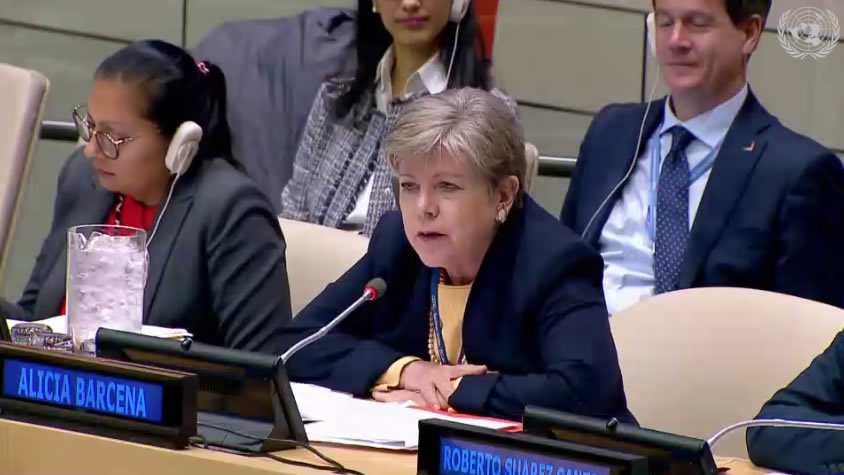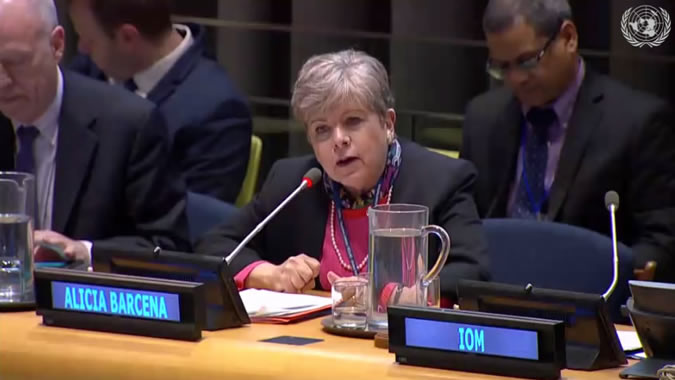ECLAC: Social, Economic and Cultural Impact of Migration is Distinctly Positive for Countries of Origin and Destination
Work area(s)
Alicia Bárcena, the regional organization’s Executive Secretary, spoke today during a high-level debate on international migration and development held at the United Nations headquarters in New York. Prior to that, she participated in a meeting of ECLAC’s Committee of the Whole.

Although major movements by migrants can entail costs, they also have a social, economic and cultural impact that is distinctly positive in both countries of origin and destination, Alicia Bárcena, Executive Secretary of the Economic Commission for Latin America and the Caribbean (ECLAC), affirmed today.
ECLAC’s most senior representative, in her role as coordinator of the five United Nations regional commissions, spoke today during a high-level debate on international migration and development that was held at the UN headquarters in New York. Prior to that, she participated in a meeting of ECLAC’s Committee of the Whole, in which the region’s countries recognized the commission as a crucial actor on the regional dimension of implementation of the 2030 Agenda.
Alicia Bárcena spoke on the panel entitled Addressing capacity building gaps, mobilizing resources and developing processes and policies and building partnerships, where she highlighted, among other issues, the role of the regional commissions in achieving the goals and implementation of the Global Compact for Safe, Orderly and Regular Migration.
In addition to ECLAC’s Executive Secretary, the panelists included Shahidul Haque, Foreign Secretary of the government of Bangladesh; Henriette Geiger, Director for People and Peace at the Directorate General for Development and Cooperation of the European Commission (DG DEVCO); Roberto Suárez-Santos, Secretary General of the International Organization of Employers; and Alexis Bautista of Migrant Forum in Asia, Global Coalition on Migration.
In her remarks, Alicia Bárcena noted that the benefits of migration for economic growth are undeniable: “In 2015, the contribution of migrants to global GDP was approximately $6.7 trillion dollars, equivalent to 9.4% of global GDP.”
She also said that a concrete example of the positive impact of migration in countries of destination lies in the key role that Latin American migrants play in demographic reproduction and the labor market in the United States.
She explained that 38% of the workforce shortage in the United States between 2000 and 2015 was covered by Latin American immigrants, among whom Mexicans and Central Americans contributed more than 80%.
The senior United Nations official emphasized that the Global Compact recognizes the importance of the regional dimension of international migration, along with the need to intensify regional cooperation.
In that sense, she indicated that the UN regional economic commissions can contribute to implementing the Global Compact and its regional processes for follow-up and monitoring, through the empirical analysis of regional migration trends, to understand their fundamental causes, compile and produce data, provide methodologies to improve comparability, and to break the statistical silence.
They can also provide platforms for regional review and establish dialogues between governments, the private sector, civil society and other interested parties.
A key example of such an initiative is the Forum of the Countries of Latin America and the Caribbean on Sustainable Development, convened each year by ECLAC as a regional platform for follow-up and review of implementation of the 2030 Agenda and the Sustainable Development Goals (SDGs), including those related to international migration. This forum will hold its third meeting on April 22-26, 2019 at ECLAC’s central headquarters in Santiago, Chile.
ECLAC’s highest official added that the regional commissions can also produce analysis of evidence-based policies to understand the fundamental causes of human mobility and establish critical links between demography, migration, productive structures, trade and labor market opportunities in the respective regions and subregions.
Another contribution is the evaluation of the capacities needed for migrants and the communities receiving them to improve educational programs and ensure the absorption of technological progress, as well as linking implementation of the Global Compact to South-South Cooperation, including improvements in the portability of rights, social security and educational degrees, among other areas.
Earlier in the day, Alicia Bárcena participated in a meeting of ECLAC’s Committee of the Whole, in which she provided an economic and social overview of Latin America and the Caribbean and invited the region’s countries to participate in the third meeting of the Sustainable Development Forum.
In the framework of this meeting, the countries supported the administrative reform of the United Nations, being promoted by Secretary-General António Guterres, and they recognized ECLAC as a fundamental actor on the regional dimension of implementation of the 2030 Agenda.
Furthermore, these Latin American and Caribbean countries approved by acclamation the proposal that Costa Rica serve as the site of ECLAC’s next session, which will take place during the first half of 2020. They also accepted Mexico’s offer to host the Third Meeting of the Regional Conference on Social Development, which will be held during the first half of 2019.
Related content

ECLAC’S Executive Secretary Calls on the UN System to Address the Fundamental Causes of Migration
Alicia Bárcena moderated a high-level panel during an expert symposium on migration and development in New York.
Country(ies)
- Latin America and the Caribbean
Contact
Public Information Unit
- prensa@cepal.org
- (56 2) 2210 2040
